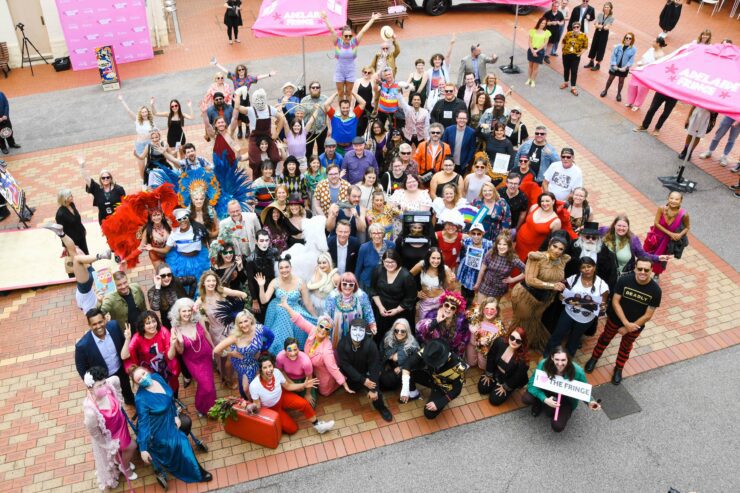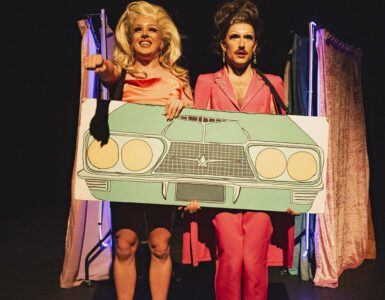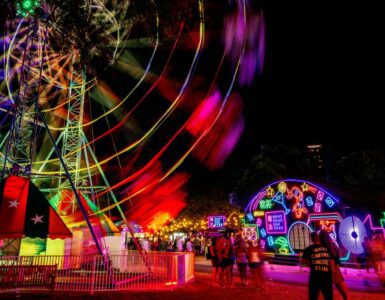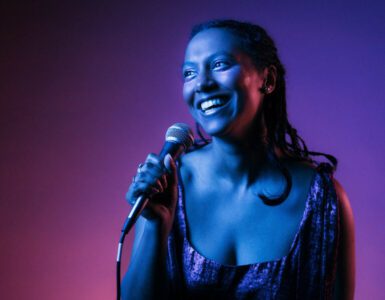Adelaide Fringe is the biggest arts festival in Australia and the second biggest Fringe Festival in the world, selling over 800,000 tickets and recording a total audience attendance of 3.5 million before the Pandemic in 2020.
It is an open-access festival showcasing everything from cabaret to circus, comedy, music, visual arts, workshops and so much more. From the 17th February to the 19th of March this year, over 6000 national and international artists will take part in 1200 shows across around 350 venues. But the figures only tell half the story. Heather Croall, as artistic director of Adelaide Fringe since 2015, is undeniably the go-to person for insight into what Adelaide Fringe is all about.
“Adelaide Fringe is the most similar to the Edinburgh Fringe in terms of the scale and experience of it … We have big outdoor hubs, lots of spiegel tents and a big circus tent. But then there’s hundreds of bricks and mortar venues in theatres, cafes, function rooms, hotels. Everything becomes a Fringe venue.”
Just as the Edinburgh Fringe sees the city metamorphose, “from the opening night of Fringe…”, Croall tells me, “…the whole city is transformed. Where lots of festivals might have one focal area, you might go to a city and you wouldn’t even know that the festival was on unless you go to that specific location. Whereas in Adelaide during fringe, it’s impossible to miss because we just take over so much of the city. It doesn’t look like Adelaide any other time of the year”.
Despite its international esteem, the festival maintains a strong tie to the city and wider state in which it takes place. According to their own figures, it generated $50.1 million for the state last year alone. Not to mention the creation of over 6000 jobs. It’s no surprise then that the festival achieves fierce local support, with South Australians of all demographics flocking to the festival in big numbers. Many Adelaide residents even open up their homes to Fringe artists.
“The audiences are out every single night and you just won’t believe it. You’ve already been in Adelaide a little bit and then when the Fringe starts, you’ll just be like, where did all these people come from? We do have tourists, but actually a lot of the people are locals. The locals love the Fringe to the point that they feel complete ownership of it.”
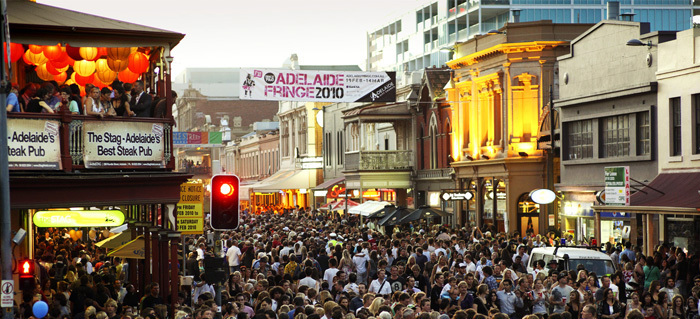
Indeed, the festival’s original raison-d’etre back in 1960 was a reaction from the local arts community against what they saw as limited opportunities at the Adelaide International Festival. The importance of the Fringe as a platform for promoting local art is further evidenced in the decision to change the festival’s name in 1975 to ‘Focus’, prioritizing the development of South Australian culture. Despite the arrival of international artists to the festival in 1988 and a reversal back to the name ‘Fringe’, the support for local artists is ever-present. The makeup of the programme reflects this with about 60% of shows across all genres coming from South Australia.
For Heather Croall, on top of its loyalty to local creatives, inclusivity, accessibility and the platforming of a diverse array of artistic voices are at the heart of Adelaide Fringe’s ethos as well as her mission as director. Not only are ticket prices affordable, but under her directorship, barriers to artist participation have been seriously lowered.
“I wanted to make the Adelaide Fringe the most inclusive festival in the world. I wanted to make sure that everybody felt that they could participate if they wanted to.”
Artists have seen the ticketing fees go from 12% to 4% leading to significant uplifts in their box office payment at the end of their season. Further, through the launch of the donor circle, micro donations at checkouts and some funding from the South Australian state government, they are now able to give around $800,000 in grants to support diverse artists and shows.
Last year, $200,000 in grants was given to First Nations creatives. The festival, located on the ancestral lands of Kaurna Yarta Miyurna First Nations people, is in Croall’s words, “focused and committed to amplifying First Nations voices”. This commitment took form in the Reconciliation Action Plan; “a strategic document that [sets] out a practical plan of action on how we can contribute to reconciliation in the community but also, how the Fringe can be a platform for First Nations artists who want to connect with audiences and tell their stories”.
Amongst a whole host of events involving First Nations creatives, the festival is kicked off on the 12th of February with the Welcome Ceremony (Kumangka Palti Yarta), in which Aboriginal and Torres Strait Island Elders and leaders share stories about their connection to Country. Following on from last year’s award-winning Sky Song, comes Electric Skies, a drone show accompanied with First Nations language, traditional song and storytelling, done in collaboration with the Aboriginal electronic music duo, Electric Fields, made up of Zacharia Fielding and Michael Ross from APY lands.
Despite these new boundary-pushing, highly collaborative genres and shows, there is still significant emphasis on more traditional Fringe genres. Comedy makes up over a quarter of the Fringe line up. Greg Fleet, a veteran Australian comedian, admits that “kind of like Edinburgh, I think there is too much comedy”. The Rhino Room venue in particular is in Greg Fleet’s opinion, “one of the best in Australia”, and sees a mix of established, local and emerging comedians grace the stage.
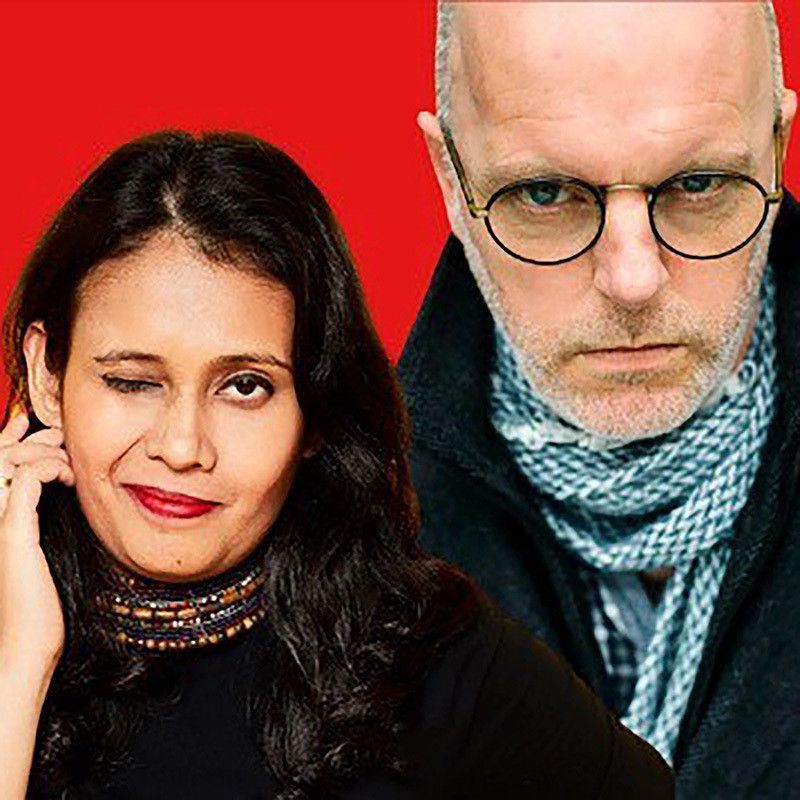
Positioned at the beginning of the year, Adelaide Fringe is generally thought of as a wading pool for new material as it is often the first destination for comedians on the festival conveyor belt, and from Greg Fleet’s experience, the commencement of a camaraderie between touring comedians.
“You’d have this thing where you go around the world and you do Adelaide and then you do the Melbourne Comedy Festival, you do New Zealand and Edinburgh, and you see the same tiny pot. So you’ve got this kind of family that travels around the world. It’s really exciting.”
Fleet, who is embarking on his 35th consecutive Adelaide Fringe with ‘A Star is Torn’ at Holden Street theatre, comments on how he has seen the festival change since his Fringe debut in 1988,
“It’s just grown up and it’s developed and the fact that there are acts from India and Edinburgh and London and the States and Germany, not to mention Melbourne and Sydney. All these different places coming together, it sort of educates itself. It has developed this really great understanding of theater and art.”
Perhaps the one thing that has remained constant throughout sixty three years of Adelaide Fringe is the good weather. For Croall, the energy of the festival is heightened by the “whole summer experience. We are on a beach so people go swimming by day and then go to the Fringe by night. We get beautiful summer days and very barmy nights under the stars.” Hmm… sounds just like Edinburgh, no?
Recommended Drink: Heather Croall very appropriately suggests an Aperol Spritz. “It’s such a summer drink. The colour of Aperol is electric and alive and it’s something that you see a lot of people drinking across the Fringe, like on a late Sunday afternoon in the sunshine.”
Maddie will be in sunny Adelaide from the Festival’s start date on the 17th February until the 25th February reviewing shows and speaking to artists.
Hear the latest from Marginalised Voices from Fringes across the World
Subscribe to our Email Newsletter so we can send you insightful updates about unheard creative voices working to platform powerful stories. You'll be the first to hear about our content and how to apply to have shows you're working on reviewed.
Powered by EmailOctopus


